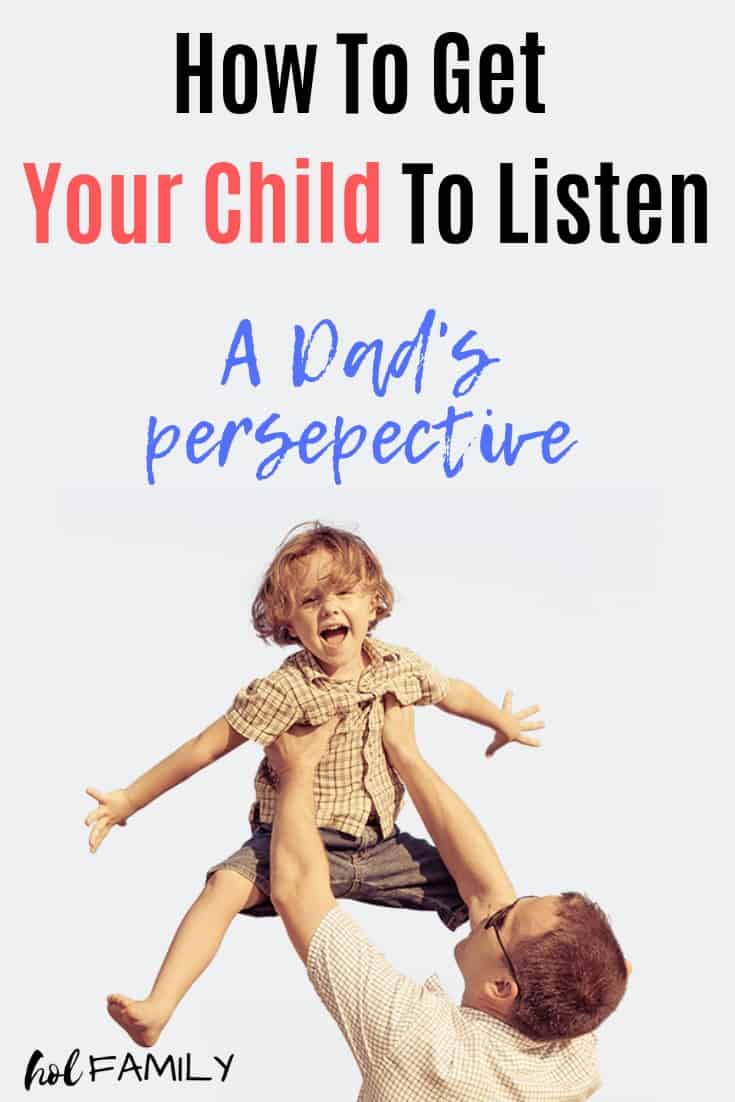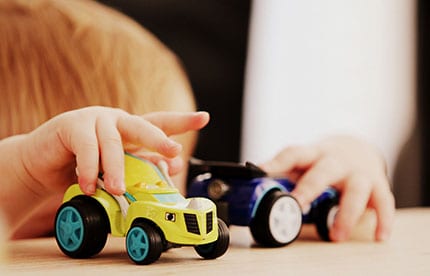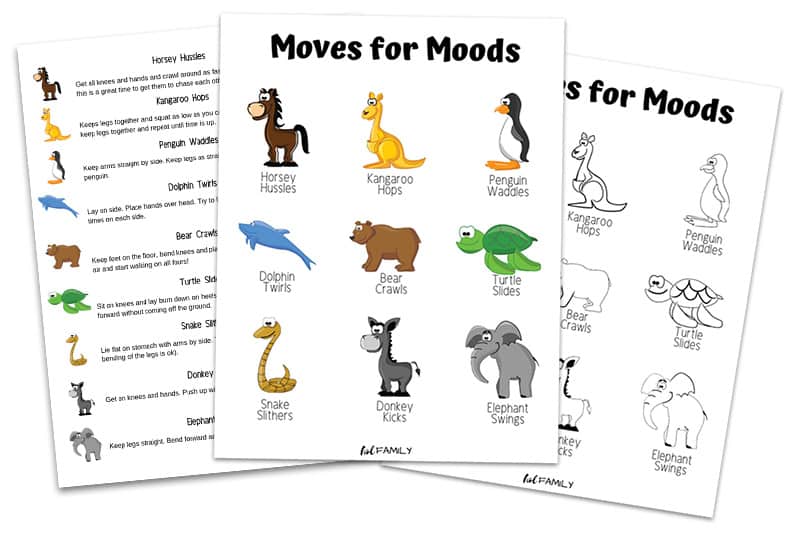
GET DRESSED! WE HAVE TO GO! NOW! DID YOU HEAR ME?! NOW!!!
Brilliant. That’s the key to getting your kids to listen, right? Just scream.
Guilty! Been there, done that. I’m sure you have to.
But it doesn’t work.
If anything it makes the situation worse and causes more push back later.
But sometimes we just can’t help ourselves. We get so caught up in the moment because we’re rushed, anxious or on a time crunch… and if you’re anything like me, being late is NOT OK.
But if yelling doesn’t get your kids to listen, what does?
I’m glad you asked.
As a dad who has struggled over the years to get his kids to listen to him, I’ve finally found some solutions that work. And I wanted to share them with you.
Connect Before You Expect
I struggled with this principle when I first read about it in Hold On To Your Kids by Gordon Neufeld (excellent book by the way)!
I felt like I was the parent, the one in charge, the head honcho and my kids should just magically listen to me when I put out a request. But the more I thought about it, the sillier that notion became to me.
Children are no different than us. They’re just smaller humans with less experience than ourselves. Once I understood this it was so much easier for me to get my children to listen without barking orders at them.
Get Down On Their Level
You need to be close to them and get down on their level. This means kneeling down so you’re the same height they are. Doing this takes away the overpowering feeling that children may feel when a much taller adult is towering over them.
Have you ever stood next to someone that towers over you? I have. And it was a bit intimidating. I imagine that’s what my kids felt when I used to do it while raising my voice at them.
Initiate Touch, Make Eye Contact and THEN Speak
Eye contact is the basis of good conversation while touch is the foundation of connection. You need both with children if you want them to listen to you.
You can softly touch your child’s arm, or stroke their hair (my son seems to love that) or even give them a hug. Then ask them, “Where are you?” or “Look at me.” Once you get that eye contact it’s important to smile and say, “Hi!” or “There you are!” or something similar.
At this point you should try to connect with them by asking a question. I usually just relate it to what they’re doing. For instance if they’re playing with a toy I might say, “You’re really into that lego! What are you building? Can you show me?”
Let them answer you. Then follow through with what you wanted to tell or ask them.
It only takes a couple of minutes to do this and it makes a profound difference in their willingness to listen to you!
Become A Child Again

Somewhere along the way most of us forget what it was like to be a child. And how to play like a child.
That’s sad.
The woes of life seem to get in the way and we become so focused on all our responsibilities that we simply become… as our kids might say, boring.
But it doesn’t have to be that way.
To some (talking to all you workaholics), playing may seem like a chore or a waste of time. But let me reassure you it’s not! Playing fosters a wonderful relationship between you and your children and doing so reminds them that you:
- Love them.
- Value them.
- Enjoy time with them.
Just 10-15 minutes of uninterrupted playtime (doing what your children want to do) could quickly fill their love tank and encourage them to listen to you when it matters most.
We’re far more comfortable listening to people when we feel close to them, connected to them and valued by them. Keep that in mind while you’re playing!
You may be interested in an article my wife wrote about why 1 on 1 time is so important and how it improves behavior (including listening) and how to incorporate it into your daily routine.
Rely on Routines and Ask Your Child, “What Comes Next?”
Children thrive on routines. It keeps them grounded, calm and less anxious. The unknown can be so nerve racking and sometimes it can be downright terrifying.
When it comes to getting your child to listen, try setting routines. Better still, once you set those routines, ask your children everyday, “what comes next?”
This invites them to speak out how the day is supposed to go to you and reinforces the routine through their own repetition. It works great!
Because it reinforces the routine, this strategy is quite helpful for getting your children to listen when transitioning from one activity to the next.
Work On Not Demanding

The quickest way to lose the respect of your children is to constantly demand things from them. And when someone doesn’t respect you, they’ll never listen to you. Especially children!
I used to do this often with my firstborn. I found myself constantly correcting him for simple things that I thought he should understand.
Things such as, “sit in your chair right,” or “use your fork,” or “stop stretching your shirt,” or “stop taking your sister’s toy!” I could go on…
Don’t get me wrong though, I still think it’s important for my children to sit right, use their forks, stop mutilating their clothing and stop stealing each other’s toys but it shouldn’t be demanded of them… that’s a controlling mindset.
By taking a teaching mindset we break down the walls of resistance and invite children to learn.
So instead of saying, “stop that,” or “do this,” model the behavior you want to see and be patient. Children learn best through observing.
Remain Calm
It’s human nature to want to win an argument and to have our voice heard.
When my own children got out of hand, it was my own tendency to be louder, more dominant and seemingly more in control. In reality? As soon as I got into a yelling match or power struggle, I had lost all control. Of myself and the situation.
We simply cannot control another person, child or adult and expect things to go smoothly.
Let’s face it. Tantrums happen. It’s a part of life.
We can’t prevent them, but we can diffuse them much faster and with much less conflict if we remain calm and keep our own emotions in check.
Children are little copycats. They learn by observation and mirroring. What we display is generally what we will get back. Remain calm. Calmness will follow.
And that leads me to my next and final point…
Model Behavior
Like I said above… children are copycats. One of the big ways they learn how to act is by watching, listening and modeling others’ behavior.
As parents, our actions are constantly on display for our children to observe. And observe they do! Have you ever let a word slip that you wish you hadn’t? Did your child repeat it? How many times?
Too many times!
The point is, act how you want your children to act. When you’re speaking to them do you want them to listen to you? Of course you do.
When they’re speaking do they want you to listen to them? Of course they do! It’s a two way street. Give listening ears, get listening ears.
The question is, do we actively listen to our children? Do we give them our undivided attention when they’re talking to us or do we half-way acknowledge them while our face is glued to our phone?
No judgement here, because yours truly has been guilty of this too! Just being real.
And for the record, I’m not some super dad who came up with all these strategies by myself (ha! far from it). I’ve simply committed myself to parenting different, read some amazing books and applied what I’ve learned.
I hope this list helps you a little in getting your children to listen to you. While not an exhaustive list, it has certainly been effective for me.
Let me know in the comments what I’ve missed or what works especially for you. I’d really love to hear from you!













